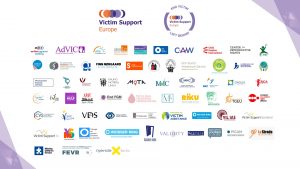
Victim Support Europe (VSE) and fellow signatories together with national member organisations have for many years been calling for strengthened EU rights, protection and support for victims of crime. This is why we welcome the European Commission’s publication of amendments to the Victims’ Rights Directive. At the same time, we regret shortcomings in the revised text and call for further action to fully protect and support victims of crime.
Welcoming the European Commission’s Publication of the Revised Victims’ Rights Directive
Across Europe, we are all affected by the many faces of crime; new threats such as cybercrime, the misuse of artificial intelligence, and extremism are on the rise. With 75 million people falling victim to serious crime in the European Union every year, each one of us is at risk of injury, financial loss and long-term trauma.
The European Union and national governments have long understood their responsibility to protect citizens from crime and address the needs of victims. As a result, the EU Victims’ Rights Directive, which establishes essential standards for victims of crime, was adopted in 2012.
However, the Directive’s text is vague with many exceptions and despite years of action, progress remains ad hoc, limited, and reactionary. Victims continue to face significant challenges: they do not receive the information they need in a timely manner, or in a way they can understand. Appropriate support services are often unavailable, leaving victims without the help they need. A lack of protection leaves them open to further harm during their interaction with the justice system. Society cannot prosper if we continue to ignore victims’ voices, disregard their needs, and fail to protect their rights.
VSE and signatories stand together on behalf of all victims: no matter who the victim, no matter what the crime, no matter where it occurred, no matter the residence status. We have long advocated for a revision of the Directive, with clearer obligations and stronger language, to ensure that no victim is forgotten or remains voiceless.
We are grateful that the European Commission has listened to these calls in its amendments to the Directive, including on improvements to court assistance, reporting, and compensation. We commend the Commission’s leadership on victims’ issues, which recognises the fundamental importance of a single legislation for all victims without exception and regardless of their residence status whilst continuing to work on specific victim groups, such as children, victims with disabilities, LGBTI victims, cross-border victims, victims of sexual violence and victims of gender-based violence.
However, the Commission has missed opportunities to propose robust amendments that fully address the rights and needs of all victims – more is required! We call for a fundamental shift in thinking – a systemic and integrated approach to victims’ issues; we advocate for the implementation of national victims’ strategies and the adoption of comprehensive national support frameworks, effective communication frameworks, and safe justice systems. In the coming weeks, we will share a detailed analysis of the amendments covering the many positive changes as well as risks and missing priorities.
VSE and signatories have been working for decades to improve the situation of the most vulnerable and most marginalised in society. This is why we commit to fully supporting the revision process, and the implementation of the Directive, and we urge the European Parliament and EU Member States to do the same. We call on all relevant stakeholders to work together, to create a Europe where each and every individual is supported and empowered after falling victim to a crime.
List of signatories:
- Action Against Stalking
- AdVIC (Advocates for Victims of Homicide)
- AGE platform
- Associação Portuguesa de Apoio à Vítima (APAV)
- Association for the Prevention and Handling of Violence in the Family (APHVF/ SPAVO)
- Association of Specialised Emergency Services, Lithuania
- Associazione Aleteia – studi e ricerche giustizia riparativa e mediazione
- Associazione Spondé O.N.L.U.S.
- ATENIN Sociedad Cooperativa Andaluza de interés social
- Bailiwick of Guernsey Victim Support and Witness Service
- Bily Kruh Bezpeci
- Brottsofferjouren Sverige
- CAW Groep
- Center for Reproductive Rights
- Child Helpline International
- CRCA/ECPAT Albania
- ECPAT
- End FGM
- European Sex Workers Rights’ Alliance (ESWA)
- European Disability Forum
- European Federation of Road Traffic Victims (FEVR)
- European Forum for Restorative Justice
- Federation for Victim Assistance in Ireland
- Fehér Gyűrű Közhasznú Egyesület
- Finn Nørgaard Association
- Fonds Slachtofferhulp
- France Victimes
- HRDC Albania
- International Road Victims Partnership
- Irish Tourist Assistance Service
- Irish Road Victims’ Association (IRVA)
- Kaunas County Women’s Crisis Centre, Lithuania
- Kaunas Women’s Line, Lithuania
- Klaipeda Social and Psychological Support Center
- Kretinga Women’s Information and Training Centre, Lithuania
- La Strada International
- MANUS LEGIS
- Missing Children Europe
- Offerrådgivningen i Danmark (Victim Support Denmark)
- Opferhilfe Berlin e.V.
- Platform for International Cooperation on Undocumented Migrants (PICUM)
- Raseiniai Crisis Centre, Lithuania
- Rete Dafne Italia – Rete Nazionale dei Servizi per l’Assistenza alle Vittime di reato.
- Skalbes
- Slachtofferhulp Nederland
- Terre des Hommes Netherlands
- TGEU (Transgender Europe)
- The Commission for Victims and Survivors
- Validity
- Victim and Witness Support Croatia
- Victim Support at Court
- Victim Support Europe
- Victim Support Finland
- Victim Support Malta
- Victim Support Northern Ireland
- Victim Support Scotland
- Victimology Society of Serbia-VDS
- VILIAS
- Weisser Ring Austria
- WEISSER RING Germany
- White Circle Croatia
- Women’s Activity Innovation Centre, Lithuania
- Women’s Information Centre, Lithuania
- Women’s Rights Association, Lithuania
- Women’s Room
- Wspierania Działań na Rzecz Osób Potrzebujących Pomocy DROGA


Join the discussion 2 Comments